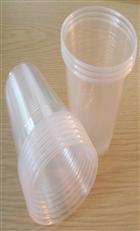
Reduce and Re-use:
Cut the amount of waste created from office beverages by using ceramic mugs and real glasses. When washing these items to be re-used, try using an environmentally friendly washing up liquid, like the Ecover brand.
Some plastic cups and bottles are not suitable for reuse, as they may begin to leak chemicals from the plastic as they are designed to be thrown away. If you are unsure about the plastic cup/bottle you are going to refill, don't take a risk, contact the manufacturer.
Why recycle vending cups:
Millions of vending cups are used each month, most of which get disposed of to landfill. The cups then remain in the environment for many years.
Recycling plastic cups will save this waste.
Of course, the more environmentally friendly suggestion would be to start with the other 2 R’s, Reduce and Re-use, as above.
Save a Cup:
Save a Cup went into administration earlier this year (2012) but have since been taken over by Recycling Options Ltd.
Contact details can be found on the website.
Click here for more information.
Fascinating Facts:
· Recycling one tonne of plastics saves enough energy to run a refrigerator for a month.
· 69% of plastic waste comes from two uses; packaging and materials handling.
· It takes 125 recycled plastic milk bottles to manufacture one 120 litre wheelie bin from recycled plastic.
· Plastics are made from oil, a major contributor to global warming and the degradation of the natural environment.
· Manufacturing plastics from recycled materials uses 30% of the energy required to make virgin plastic products from fossil fuels.
· The recyclate material is usually cheaper for manufacturers than using virgin polymer material. Due to reduced refining and heating costs.